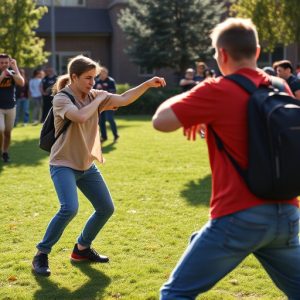Mastering Personal Safety: A Student’s Guide to Self-Defense on Campus
College students face unique personal safety challenges as they adapt to independent living. A compr…….
College students face unique personal safety challenges as they adapt to independent living. A comprehensive self-defense program tailored for this demographic is essential, going beyond physical techniques to encompass awareness of personal boundaries, environmental risks, and avoidance strategies. It also includes understanding the legal implications of using force, learning simple yet effective self-defense maneuvers that cater to different body types, and leveraging campus safety resources effectively. Campuses should actively provide access to emergency hotlines, security services, and self-defense training workshops to empower students with the knowledge, skills, and resources they need to protect themselves. Self-defense for college students is about cultivating a holistic approach to safety that empowers them with confidence in their campus environments. This includes practical skills like setting clear boundaries, physical defense techniques derived from martial arts, strength conditioning, and practicing drills that mimic real-life assault scenarios. By integrating these self-defense measures into campus life, educational institutions can significantly enhance the personal safety of their students. Self-defense training is a vital component of campus safety initiatives, addressing not only physical defense but also topics like consent and autonomy to promote proactive prevention strategies and situational awareness. Through interactive learning experiences, college students can confidently navigate potentially dangerous situations, reinforcing their readiness to defend themselves effectively should the need arise.
College campuses are vibrant hubs of learning and growth, yet they also present unique safety challenges. Ensuring that students are equipped with knowledge and skills to navigate these environments confidently is paramount. This article delves into the essentials of self-defense tailored for college students. It outlines vital techniques and strategies to enhance personal safety on campus, promotes empowerment through education, and highlights valuable self-defense workshops and training initiatives within academic settings. Understanding self-defense becomes a cornerstone in fostering a safer educational environment.
Understanding Self-Defense for College Students: A Comprehensive Guide
When it comes to personal safety, college students are a unique demographic that requires tailored advice on self-defense. As young adults transitioning into independent living, they often find themselves in unfamiliar and potentially risky situations. It’s crucial for this group to understand the principles of self-defense, not just as a skill but as an awareness practice that encompasses personal boundaries, environmental awareness, and risk avoidance. Self-defense for college students extends beyond physical techniques; it involves learning how to assess potentially dangerous scenarios, recognizing predators’ manipulative tactics, and having a plan in place should they find themselves in distressing situations.
College campuses are vibrant communities where safety measures should be robust. Students should be equipped with practical self-defense strategies that can be effectively used if confronted. This includes simple yet effective self-defense moves tailored to various physical limitations and capabilities, as well as understanding legal implications for using force when necessary. Additionally, students must stay informed about campus safety resources such as emergency hotlines, security personnel, and self-defense workshops that many educational institutions offer. By integrating these preventative measures into their daily routines, college students can significantly enhance their personal safety and confidence in navigating campus life securely.
Key Techniques and Strategies for Personal Safety on Campus
When it comes to personal safety on campus, self-defense for college students is a critical skill that can empower individuals to protect themselves in potentially threatening situations. Effective self-defense strategies are not solely about physical techniques but also encompass awareness and decision-making skills. One key technique for college students to master is situational awareness; this involves being attuned to one’s surroundings, identifying potential hazards, and recognizing unsafe situations before they escalate. Additionally, learning how to set clear boundaries and confidently assert them can de-escalate confrontations and deter would-be assailants.
For physical self-defense, college students should focus on straightforward, easy-to-learn techniques that are effective in high-stress environments. Basic self-defense courses often teach martial arts principles such as striking vulnerable areas of an attacker’s body, which can provide a temporary escape route. Self-defense training for college students also emphasizes the importance of strength conditioning and practicing drills that simulate real-life attacks. This proactive approach to personal safety ensures that students are better prepared to defend themselves if confronted with a physical threat on campus. It’s advisable for students to seek out self-defense workshops or classes specifically designed for their demographic, as these programs often address the unique challenges faced by those living and studying in a college environment.
Empowering Through Education: Self-Defense Workshops and Training Opportunities in Academic Settings
Self-defense for college students is a critical aspect of personal safety education that empowers individuals with practical skills and confidence. Incorporating self-defense workshops and training opportunities within academic settings provides students with the tools to navigate potentially dangerous situations. These programs often tailor their curriculum to address common scenarios faced by young adults, emphasizing awareness, prevention, and the use of verbal skills as the first line of defense. By understanding their environment and learning how to de-escalate confrontations, students can significantly reduce their vulnerability.
Moreover, these workshops often go beyond physical techniques, teaching students about the importance of boundaries, consent, and personal autonomy. They highlight the significance of self-defense not just as a reactive measure but as an integral part of a holistic approach to safety and well-being. Through interactive training sessions that may include role-playing and realistic simulations, students can practice these skills in a controlled environment, fostering confidence and readiness should they ever need to employ these strategies in real-life situations. The integration of self-defense for college students into the campus culture is a proactive step towards ensuring the safety and security of the student body.


